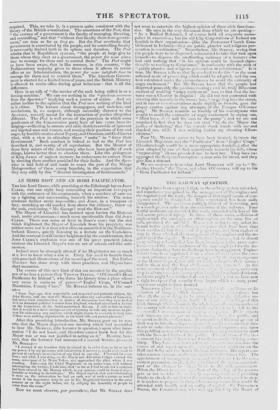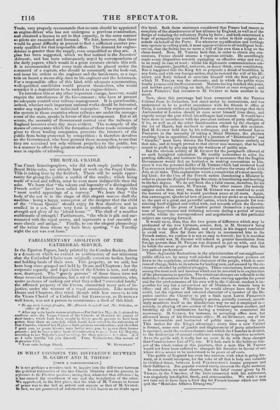' PHE RA HAVAY QUESTION.
IT might have been expeetcd that, as the railway system extended, and experience was gaincd in the menagess.unt of the engines and the regulation of the reads, the danger or that rapid :scans of con- e.:efemaa or di- n..-
:Hto the on the
:s. His r, rt con- ' line. The
appointment m.I . . '.......• ti.im.‘ com-
monest precatith,.... .-. c,,,..-1.iiiitc part of the eb..r ......i.:.m.. Agt'SS.
When the l)iree! :-. - t. 11:,: pissen-
gers as not to t:.1,... • .' proxiding
breaks to cloak the le, i :..,..I to stop, it is useless to Foie, .• : • i ;so Ize • , , that would he attended with treu!.1. .. ,..C. is. ,.11 ca,•:: ;I. `Sir Farm-Am-it Smrr II, the COIIIIIII,:•Ik•Ilk'r WI; ) W...., :1:110it:It. 1 by the Board of ;ejanc:e would la. Thisespeetation has been sadly disappointed. The ,':c(multiily instead of decreasing, and in a much gs, .11,r ratio tlnui the extension of the railways. Four fearful accidents are recorded this week, attended with loss of life and severe pessomd. iujcry. In three of these cases, collisions of engines with the earri.iges, or other enghies on the same line of rails, produced the ntischi. C It was not ov.:ing to any defect in- herent in the system of r,milv,:ay-convoyance Ilea lives have thus been ,am ;Iced ; but from ... . . mit m.f proper care, and front neglect of duty by those who had the management of the engines and the re- gol,t'on of the signal,. Not only in tins, : instonces, but in almost e:.1.1mity that has been investi,latt.l, the same care- lessness ;,:;:l the same unfitness of the men (2ttiployed for the im- portant duties they have to discharge have been apparent. Engine-
drivers have been appoi:,.. na Cloy the com-
nnmest artisans; many :Tut exposure at tile Narrow impicst, timely names ; and to these men the 11. . e-tell. At the
contr.:; ,:ement 1,1' r..il c ew, and every
step is advance w its it :1 t. , i, c7.;',.]ranical science,
accidents might be considered aln:est, a we have now
a right to expert at mccuritt. -Ili danger many years' experience ought oi have insured.
, ..Nunicrous pl,ms Leen st,—, munition of dalc,•.: ration ; but
alter ail, the :g to le, etive na- ture of our it, 71. of this k;!,d, through w!s out ' " emn:catiois of
i!.s country will e. ;,..) be left to the
..eaastrolhel Thu ohjects
and inten.sts t public, and
to spend tt6 litCim, : c C.,.1. 1..) go out of their way to intfolth -!! theirra. upon
this peddling syslent iris:.
(lends to make -sort with the lives and !H I s •
vernmcnt ' thing. The ■ l ::, valises of and Hull and Selby and
tains a severe
Trade, very properly recommends that no man should be appointed as engine.driver who has not undergone a previous examination, and obtained a licence to act in that capacity, in the same manner as-pilots are examined and licensed. We fear, however, that there would be great difficulty at present to find a sufficient number pro- perly qualified for that responsible office. The demand for engine- drivers is greater than the supply, even unqualified as they are. A plan has been suggested, which we first noticed in the Inventors' Advocate, and has been subsequently urged by correspondents of the daily papers, which would in a great measure obviate this evil. It is recommended that every train should be placed under the command of a captain, who should be constantly on the look-out, and issue his orders to the engineer and the breaksnicn, as a cap- tain on board a steam-ship does to his engineer and the helmsman. For a responsible office of this kind, with adequate remuneration, well-qualified candidates would present themselves, who would consider it a degradation to be ranked as engine-drivers.
To introduce this or any other important change, however, would require the interference of the Government ; who have at present no adequate control over railway-management. It is questionable, indeed, whether such important national works should be intrusted, under any regulation, to individual enterprise. The experience of the system in those countries where railways arc under the manage- ment of the state, speaks in fivour of that arrangement. But at all events, the necessity of Government control over the railways of England becomes every day more evident. The monopoly of the means of conveyance which the formation of these roads necessarily gives to those trading companies, prevents the interests of the public from being protected by competition : it therefore devolves on the Government, who have granted those monopolies, to see that they are exercised not only without prejudice to the public, but in a manner to afford the greatest advantage which railway-convey- ance is capable of afibrding.



























 Previous page
Previous page